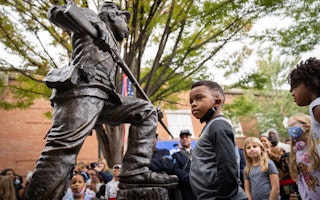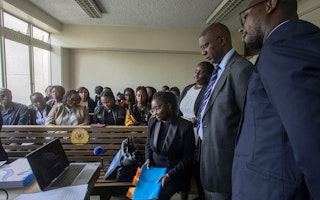
Sparked by the Movement for Black Lives and in response to authoritarian measures enacted during the COVID-19 pandemic, vibrant waves of protests for racial justice and democracy are flourishing worldwide.
Congressman John Lewis, the iconic United States civil rights leader, spoke eloquently about the power of protests and the need to get into what he called “good trouble.” He recognized that peaceful assembly and nonviolent protest have the power to disrupt and dismantle entrenched authoritarian political structures, and to further the structural reforms required to secure economic and racial justice.
As Black Lives Matter and other movements advocating for social justice have focused attention on the need to address inequities and racism, security forces have often met protesters on the street with violence. And governments around the world have enacted new laws aimed at curtailing the right to protest, often citing the pandemic as a reason to lock protesters up.
What is new and different about these protests? Have they been effective? What can be done to protect the rights of all people to get into “good trouble”?
The event will be live-streamed on YouTube Live on September 29, 2020.
Speakers
-
Michelle Bachelet
Speaker
Michelle Bachelet is the UN high commissioner for Human Rights.
-
Patrick Gaspard
Speaker
Until December 2020, Patrick Gaspard was president of the Open Society Foundations.
-
Christof Heyns
Speaker
Christof Heyns is a former UN special rapporteur and member of the Human Rights Committee.
-
Mary Harvey
Speaker
Mary Harvey is chief executive officer of the Centre for Sport and Human Rights.
-
-
Peter Mutasa
Speaker
Peter Mutasa is president of the Zimbabwe Congress of Trade Unions.
-
Nneka Ogwumike
Speaker
Nneka Ogwumike is president of the WNBA Players Association.
Read more
Racial Justice
Litigating for the Statistical Visibility of Afrodescendants in Colombia

Afro-Colombians have long endured social and systemic invisibility. Through legal action, civil society is fighting the miscount of the Black population for a more accurate representation.
Power and Public Memory
Q&A: Why Monuments Must Change

We tend to think of monuments as being immutable, permanent structures. But the nonprofit group Monument Lab is on a mission to change the way the U.S. thinks about monuments and their relationship with power and public memory.
Hate Speech
In Africa, Taking on Viral Hate

Facebook users in some African countries are exposed to higher levels of violent content, hate speech, and misinformation. The consequences can be deadly. A legal challenge seeks to force the social media giant to fix it.